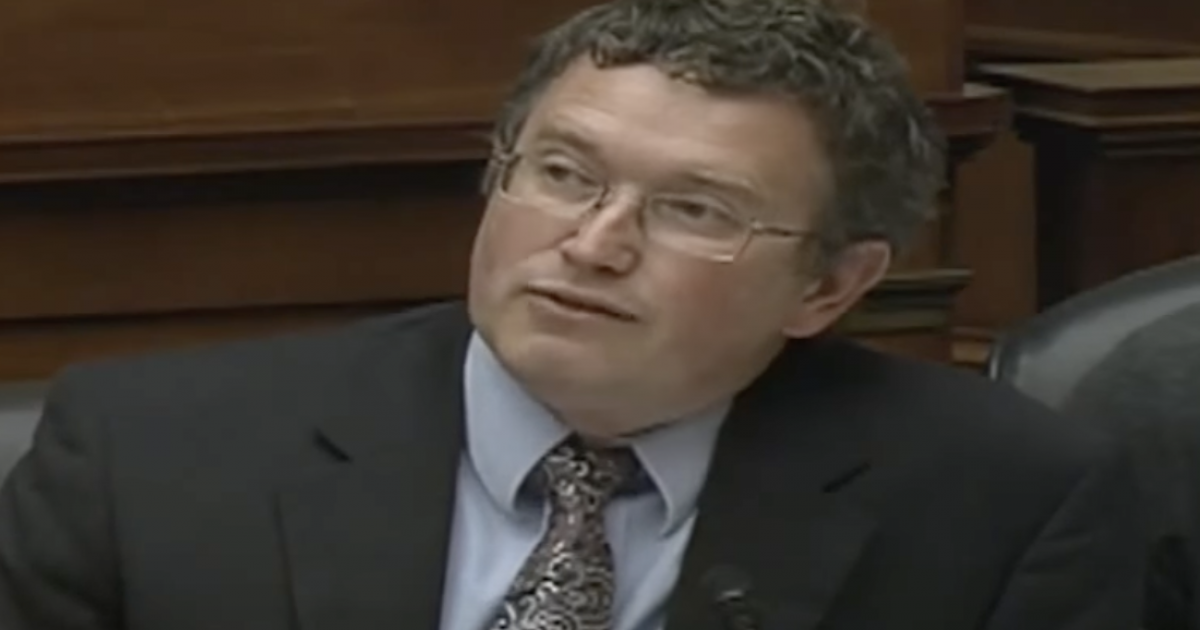
Few Republicans understand monetary policy like the way Kentucky Congressman Thomas Massie does.
As a strong disciple of former Congressman Ron Paul, Massie is a devoted proponent of sound money. He doesn’t just talk the talk, he walks the walk when it comes to pushing legislation that breaks the fiat monetary system’s monopoly on monetary affairs in America.
Massie recently introduced HR24, the Federal Reserve Transparency Act, which would conduct an audit of the Federal Reserve.
In a tweet he posted on March 22, 2022, Massie declared, “I present to you the Federal Reserve balance sheet, and some still wonder why there’s historic inflation now. My bill #HR24, The Federal Reserve Transparency Act, would #auditthefed for real.”
I present to you the Federal Reserve balance sheet, and some still wonder why there’s historic inflation now. My bill #HR24, The Federal Reserve Transparency Act, would #auditthefed for real. pic.twitter.com/403YzOcGNv
— Thomas Massie (@RepThomasMassie) March 22, 2022
According to figures from the Federal Reserve, the central bank increased its balance sheet from $2.0 trillion at the start of 2009 to $8.9 trillion in 2021. The Fed is notorious for increasing the money supply and distorting interest rates, just like any other central bank.
Politicians like Massie, who actually understand monetary policy, recognize the dangers of central banking and how it facilitates government expansion.
In a separate tweet thread, Massie outlined what Fed policy enables.
In the first tweet, Massie noted, ““Debt monetization or monetary financing is the practice of a government borrowing money from the central bank to finance public spending instead of selling bonds to private investors or raising taxes.”
“Debt monetization or monetary financing is the practice of a government borrowing money from the central bank to finance public spending instead of selling bonds to private investors or raising taxes.”
— Thomas Massie (@RepThomasMassie) March 22, 2022
Debt monetization is a risky policy that usually generates inflation, hence many countries’ decision to prohibit the practice. Massie detailed this:
It is prohibited in many countries, because it is considered dangerous due to the risk of creating runaway inflation. To prevent inflation getting out of hand, central banks often keep a close eye on the Consumer Price Index.
“It is prohibited in many countries, because it is considered dangerous due to the risk of creating runaway inflation. To prevent inflation getting out of hand, central banks often keep a close eye on the Consumer Price Index.”
— Thomas Massie (@RepThomasMassie) March 22, 2022
Massie then exposed how deficit financing through debt monetization leads to monetary expansion:
When government deficits are financed through debt monetization the outcome is an increase in the monetary base, shifting the aggregate-demand curve to the right leading to a rise in the price level.
“When government deficits are financed through debt monetization the outcome is an increase in the monetary base, shifting the aggregate-demand curve to the right leading to a rise in the price level.”
— Thomas Massie (@RepThomasMassie) March 22, 2022
The Kentucky congressman noted one of the nasty effects of debt monetization:
When governments intentionally do this, they devalue existing stockpiles of fixed income cash flows of anyone who is holding assets based in that currency.
“When governments intentionally do this, they devalue existing stockpiles of fixed income cash flows of anyone who is holding assets based in that currency.”
— Thomas Massie (@RepThomasMassie) March 22, 2022
Massie observed that the inflation we see in America and in many other countries is the product of debt monetization:
The cause of today’s inflation is debt monetization. And yes it is worldwide to a large degree. This isn’t theoretical or even seriously debated by economists, because it’s a fact. These quotes were taken from the wiki page on debt monetization:
The cause of today’s inflation is debt monetization. And yes it is worldwide to a large degree. This isn’t theoretical or even seriously debated by economists, because it’s a fact. These quotes were taken from the wiki page on debt monetization:https://t.co/ABXbsd0gxg
— Thomas Massie (@RepThomasMassie) March 22, 2022
Massie concluded by observing that the Fed has engaged in expansionary monetary policies that have resulted in inflation, which is hard to reverse:
The Federal Reserve has created trillions of US dollars from thin air and loaned them to the US government by buying Treasury securities with the new dollars. Because it is very hard to unwind, the expansion of the money supply, and concomitant inflation, is probably permanent.
The Federal Reserve has created trillions of US dollars from thin air and loaned them to the US government by buying Treasury securities with the new dollars. Because it is very hard to unwind, the expansion of the money supply, and concomitant inflation, is probably permanent. pic.twitter.com/0xRgTjSpTF
— Thomas Massie (@RepThomasMassie) March 22, 2022
It’s a sad state of affairs when there’s only one representative in Congress that’s talking about big picture issues, But we have to start somewhere.
The next step is for right-wing populists to start talking about sound money. Working class Americans tend to get rocked by inflation the most, as they generally rely on fixed incomes or keep a lot of money in cash.
With America entering a period of stagnation, sound money advocates have a unique opportunity to make the case for free market money. Let’s not pass up on this chance to educate people on the benefits of free market monetary standards.



